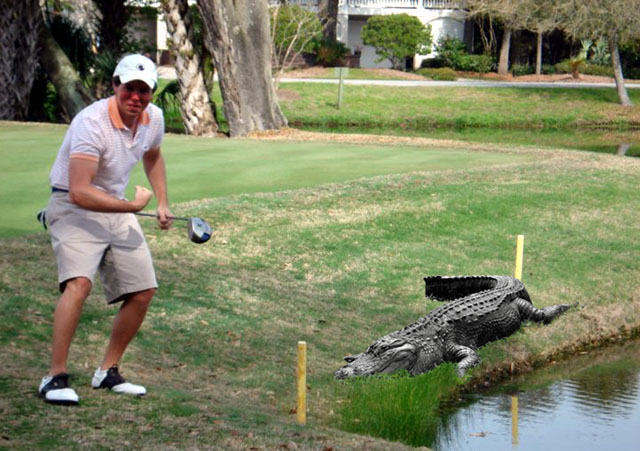|
David B. Cronheim
Georgia Supreme Court Rules Against
Decedents of 83 Year Old Woman Killed By Alligator in Georgia
Golf Course Community
Anyone who has ever played golf
in Florida knows that alligators are a ubiquitous feature on
golf courses throughout the state. However, for our neighbors
just to the north, the question of whether a person would know
there were alligators lurking in a golf course lagoon made it
all the way to the Georgia Supreme Court.
In June, the court ruled that
the family of a woman who was killed by an 8-foot alligator while
walking in her daughter's planned golf community cannot recover
against the course or homeowners' association.
According to the opinion, 83
year-old Gwyneth Williams was house-sitting for her daughter
and son-in-law at their house in The Landings, an upscale golf
development on Skidaway Island near Savannah. On the evening
of October 5, 2007, Williams went for a walk and was attacked
by an alligator. Her body was found floating in the lagoon the
next morning. Later, authorities killed an 8-foot alligator in
the lagoon and parts of Williams' body were recovered from the
animal's stomach.
Williams' relatives filed suit
against The Landings under a premises liability theory. A closely
divided Supreme Court ruled 4-3 that Williams' claim against
the resort was barred as a matter of law because Williams had
the same knowledge regarding alligators as The Landings did.
The majority, citing a 1968 Georgia case (McKnight v. Guffin)
held that:
"The true ground of liability
is the proprietor's superior knowledge of the perilous instrumentality
and the danger therefrom to persons going upon the property.
It is when the perilous instrumentality is known to the owner
or occupant and not known to the person injured that a recovery
is permitted. One who is familiar with the premises cannot rely
for recovery upon the negligence of the defendant in failing
to correct a patent defect where such party had equal means with
the defendant of discovering it or equal knowledge of its existence."
In other words, Williams could
not recover because alligators were not a latent defect or trap
on the premises. On the contrary, the presence of alligators
was open and apparent to all, and specifically to Williams who,
testimony showed, had seen alligators on several occasions while
driving through the community.
The three dissenting justices
countered that while Williams may have known there were alligators
in the lagoons, she may not have known how big they were simply
by virtue of having seen an alligator while driving through the
community. Whether Williams knew the lakes held "large and
aggressive alligators" was a question for the jury, the
dissent asserted.
The dissent also argued that
The Landings affirmative actions heightened its duty to community
residents because "The Landings Association had an advertised
policy that it removed from the 151 lagoons in the community
alligators which were seven feet long or larger and/or alligators
which were aggressive towards humans or pets." Moreover,
The Landings did not post signs near the lagoons warning guests
about alligators. In concert, these two factors, the dissent
argued, weighed in favor of allowing a jury to decide whether
The Landings exercised reasonable care.
However, in the end, the majority's
decision is a victory for personal responsibility. Williams knew
there were alligators present in the community and went for a
walk anyway. Her family should not be able to recover against
the community. Writing for the majority, Justice Melton stated
that:
"Williams chose to go for
a walk at night near a lagoon in a community in which she knew
wild alligators were present. This act undisputably shows that
Williams either knowingly assumed the risks of walking in areas
inhabited by wild alligators or failed to exercise ordinary care
by doing so."
As to whether Williams knew the
lagoons contained large and potentially man-eating alligators,
the majority held that whether Williams knew large alligators
were present was irrelevant. She certainly knew alligators inhabited
the area. As the court put it: "Williams was not incompetent.
A reasonable adult...understands that small alligators have large
parents and are capable of moving from one lagoon to another,
and...therefore, assumes the risk of an alligator attack when,
knowing that wild alligators are present in a community, walks
near a lagoon...after dark."
In conclusion, while the tragedy
occurred in Georgia, the case is nonetheless instructive. Golf
courses and homeowners associations will no doubt be pleased
by the finding of no liability, but may miss the larger issue.
The narrow decision shows that if only a few factors had been
altered only slightly, the case could easily have gone to a jury.
For example, had the attack occurred on Williams' first visit
to the community before she had seen an alligator, her family
would have had a much stronger case. As is, the course and homeowners'
association racked up enormous legal bills litigating the matter
all the way to the state supreme court. A legally sound alligator
policy upfront would have saved The Landings hundreds of thousands
of dollars in legal fees.
For suggestions on how to minimize
premises liability and/or develop an alligator policy, David
B. Cronheim welcomes homeowners associations and golf courses
to contact him at DBCronheim@nmmlaw.com.
David B. Cronheim, Esq. is an
attorney at the law firm of Norris, McLaughlin & Marcus,
P.A., a member of the Florida Bar, and author of the golf law
blog Tee, Esq. |